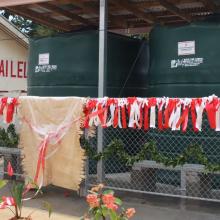
There has been a marked decline in Pacific development and progress against the SDGs since the early 2000s, attributable to the impacts of major disaster events, remoteness of Pacific Island countries (PICs) and distance to markets, and the constrained size of Pacific economies, private sectors, government administrations and populations.
The region remains the most aid-dependent globally based on per-capita aid and reliance on external support. Likely related to the development challenges just mentioned, data also shows that aid projects are less effective on average in the Pacific than elsewhere in the developing world.
The ongoing lack of development progress despite a growing array of projects and donor engagements in the Pacific continues to raise uncomfortable questions around both development and aid effectiveness, and the modalities used for aid delivery in PICs.
Over the last five years, discussions about the effectiveness of development financing modalities and the need to reform the global financial architecture have gained momentum. From calls for multilateral banks to reform, to initiatives like Bridgetown and ongoing dialogue around the Green Climate Fund, there is a growing recognition that developing countries continue to face substantial challenges in accessing finance. These challenges are often linked to structural issues in how aid is designed, programmed and delivered, including concerns around high transaction costs.
PICs face major barriers to climate finance, which is poorly aligned with Pacific priorities. Over the last decade, climate financing has continued to be characterised by a proliferation of multilateral initiatives, funds, facilities, project management firms, consultants and development coalitions tasked with addressing a colourful array of different and sometimes overlapping issues. Accessing funds from this web of opportunities means navigating a range of processes, requirements, meetings, committees and launch events which must be bolted onto existing national processes and responsibilities.
Duplication is prevalent, the burden on small administrations is significant and the transaction costs are always high. Most concerning of all, though, is the fragmentation. In the Pacific, urgent measures to improve the effectiveness of climate finance have been called for by leaders for a number of years and this is now an increasing focus of policy and dialogue.
Read the full article on DEVPOLICYPLOG.’s website.
- Log in to post comments

